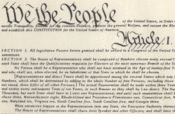Textual
 From Conservapedia
From Conservapedia | Part of the series on |
| U.S. Discrimination Law |

|
| Standards of Review |
| Other Legal Theories |
| Defining Moments in Law |
|
The 14th Amendment |
| Modalities of Constitutional Law |
|
Textual |
A type of "textualism" is "meta-textualism." This method of interpretation suggests that all phrases in the Constitution are related, and should be interpreted as such. An example of a meta-textual interpretation would hold it erroneous that while the enforcement clause of the Thirteenth Amendment is read broadly, the enforcement clause of the Fourteenth is read narrowly, despite their grammatical similarities. Meta-textualism would read the two as necessarily equivalent.
References[edit]
↧ Download as ZWI file | Last modified: 02/25/2023 13:38:50 | 20 views
☰ Source: https://www.conservapedia.com/Textual | License: CC BY-SA 3.0
 ZWI signed:
ZWI signed: KSF
KSF